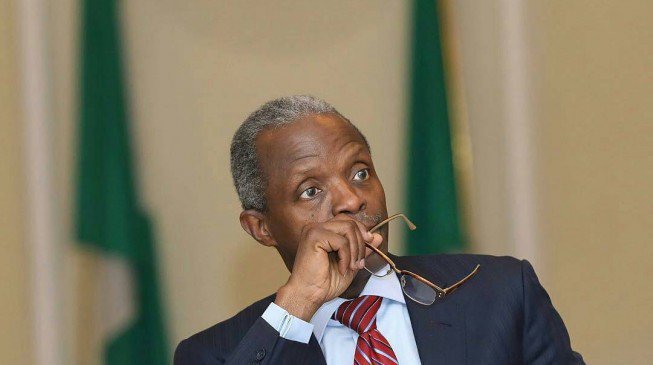
Teetering on the brink of financial fiasco after a period of recession, state governments in Nigeria have once again been given gilt-edged tips on how to escape from their self-inflicted insolvency. For this, Vice-President Yemi Osinbajo has proposed a radical shift in the way states are being run. Currently, they depend heavily on the monthly federally allocated revenue to make ends meet. As a result, most of them are close to financial ruin.
In a detailed analysis at the annual Leadership Newspapers Conference with the theme: “Towards Financially Viable State Governments,” Osinbajo advocated, as this newspaper has always done, that state governments “must think, plan and act as (separate) countries.” This is a sound argument. Osinbajo said, “In many cases, states have control of the resources that can make a tremendous difference in the way they operate.” Surprisingly, states are looking the other way and thus their economic morass deepens.
Out of the 36 states, Lagos stands out. Since 1999, it has been able to raise its income profile, ploughing investment into social infrastructural renewal and security. Without the monthly dole from oil revenue, other states wallow in economic woes. At a stage, about 27 of them were not able to pay salaries. To save them from bankruptcy, the Muhammadu Buhari-led Federal Government gave them bailout and Paris Club refunds amounting to N1.75tn as of April 2017.
Although the economy is officially out of recession, most states are not solvent. Data from the National Bureau of Statistics state that of the N931.2bn internally generated revenue by the 36 states in 2017, Lagos alone accounted for N333.9bn. While Rivers (an oil producing state), raked in N89.4bn, Bauchi made N4.36bn, Kebbi N4.39bn, Ekiti N4.96bn and Borno N4.98bn. Yobe had the lowest IGR of N3.59bn.
This mess is exacerbated by the high cost of governance, administrative ineptitude and corruption; the bastardisation of the federal system has turned these states to beggars. Cap in hand, they go to the Federal Government every month to share the resources generated from oil in the Niger Delta. This system is the crux of their malaise.
Certain that oil income will be shared every month, the states have become progressively uncompetitive. Therefore, they do not plan to create wealth or jobs. There is no independent or rigorous policy idea to grow their economies. This culture of laziness has fostered poverty, underdevelopment, crime and social dysfunction.
In addition, they embark on uneconomical projects or white elephants that serve just their personal egos. Take the fad of airport construction. Although aviation experts calculate that only three Nigerian airports are economically viable, state governments blindly plunge into these projects. At least 17 state governments have sunk billions of naira into these airport projects. It is sheer waste of the taxpayer’s money and economic folly.
Being a federal system – no matter the current imperfections – economic renewal is possible. With deepening poverty, states cannot afford to resign themselves to their fate any longer. While not understating the challenges, governors have the duty to kick-start economic revival in their domains with ideas-driven policies. The success story of Lagos is built on a foundation laid by Bola Tinubu in 1999. To their credit, Babatunde Fashola, his successor, and the incumbent, Akinwunmi Ambode, have not deviated significantly from the template. In other states, there is no sustenance of policies, which hurts their economies.
Nothing will change however until the states are forced to start looking inwards. States that want to expand their economies should stop depending on federal allocations. In other words, they should regard such as a bonus and dam it, save it or invest it. Nothing stops a state government from creating its own sovereign wealth fund.
They should develop based on their unique endowments, environment and characteristics. However, all of them should provide quality education to their citizens. Almost all the states are rich in mineral types. For now, they are not benefiting from this resource. In Zamfara and some other states, artisans are the ones engaged in mining at the expense of public revenue. It is time for states to organise mining activities according to global best practices.
It is vital for agriculture-rich states to develop rural road infrastructure; provide security and liberalise their environment to encourage the private sector in the agriculture value-chain. This will boost farmers’ income. To enhance real estate, states should provide infrastructure at new sites for investors. Instead of increasing taxes arbitrarily or having multiple tax regimes, they should drive their revenue by expanding their tax net. Giving a tax holiday to start-ups will encourage these ventures to spring up in every state.
On its part, the Federal Government should loosen its hold on the commanding heights of the economy by privatising the downstream oil sector, electric power, the steel and mining sector and the railways.
Above all, in the spirit of federalism, restructuring is truly the way forward. A good case study is California. According to the World Bank, the American state returned to being the fifth largest economy in the world as of 2017 with a GDP of $2.7tn. Between 2016 and 2017, it grew its GDP by $127bn. With low taxes and firm but non-intrusive regulation, it is home to the Silicon Valley and four of the wealthiest companies in the world. It is strong in agriculture, which contributes $37bn to its GDP, manufacturing ($256bn) and IT ($732bn).
Therefore, by being able to control their resources, it will unleash the creative and competitive powers of the states for economic progress. This should be implemented soon to take the people out of poverty.
END

Be the first to comment